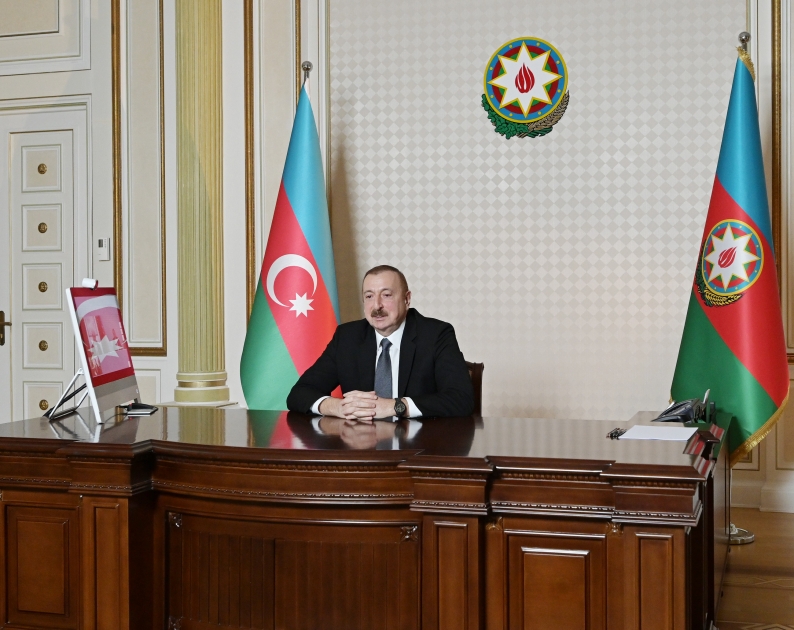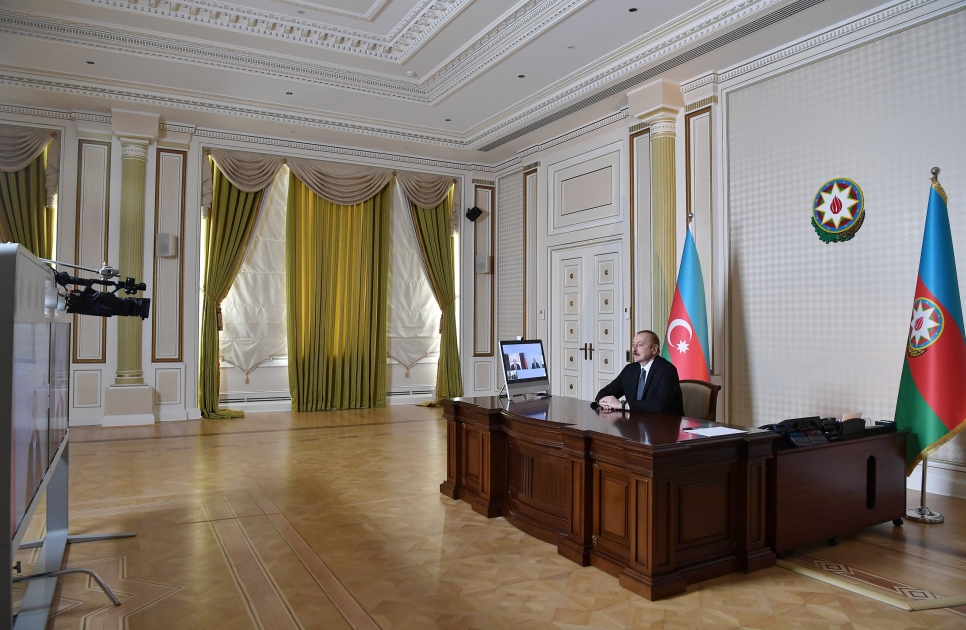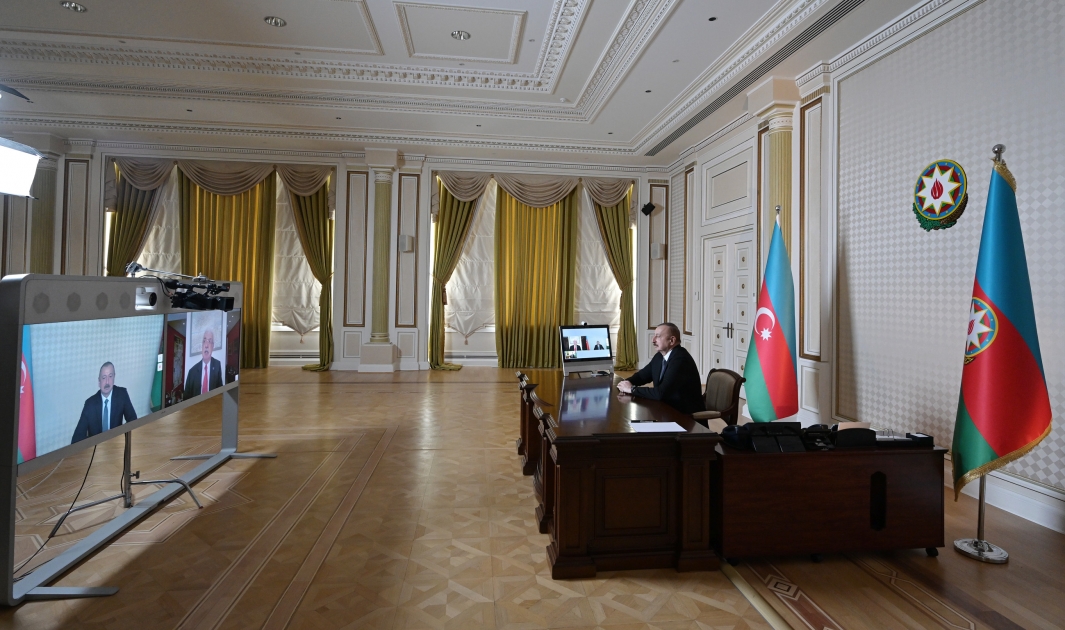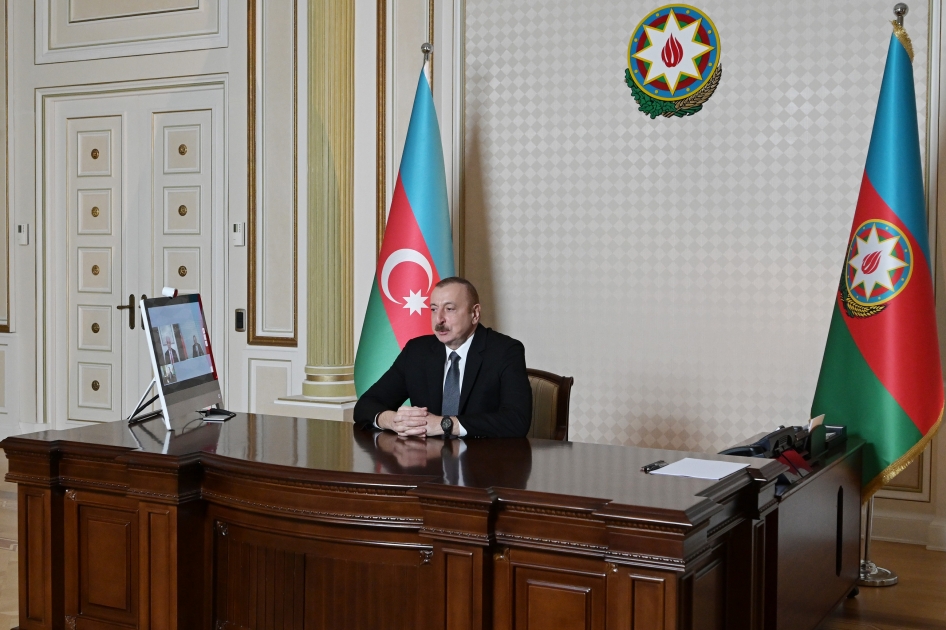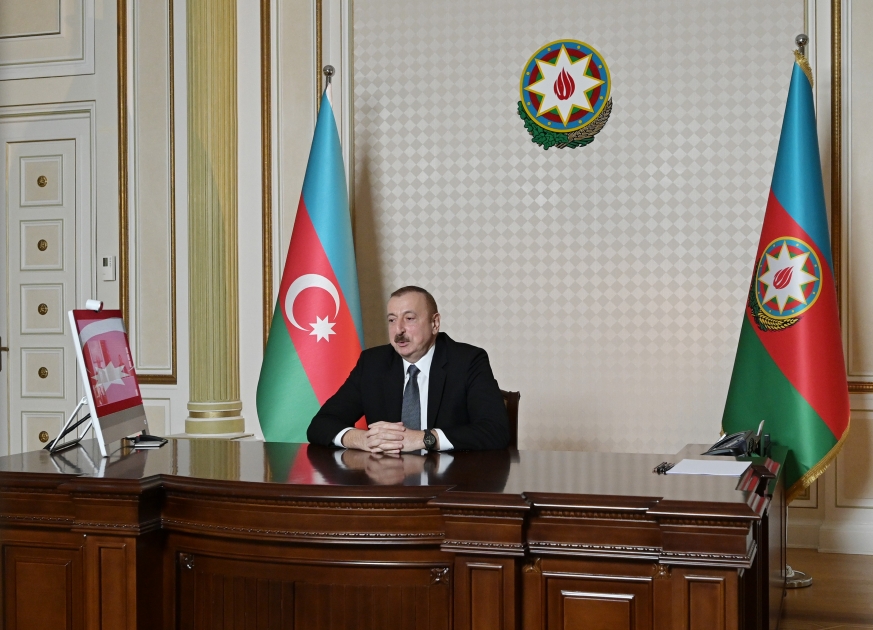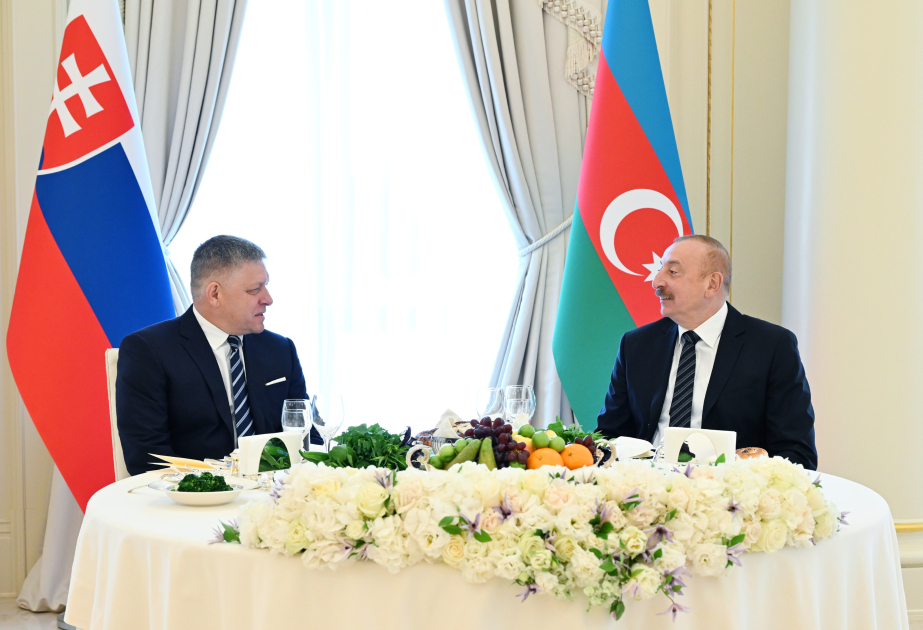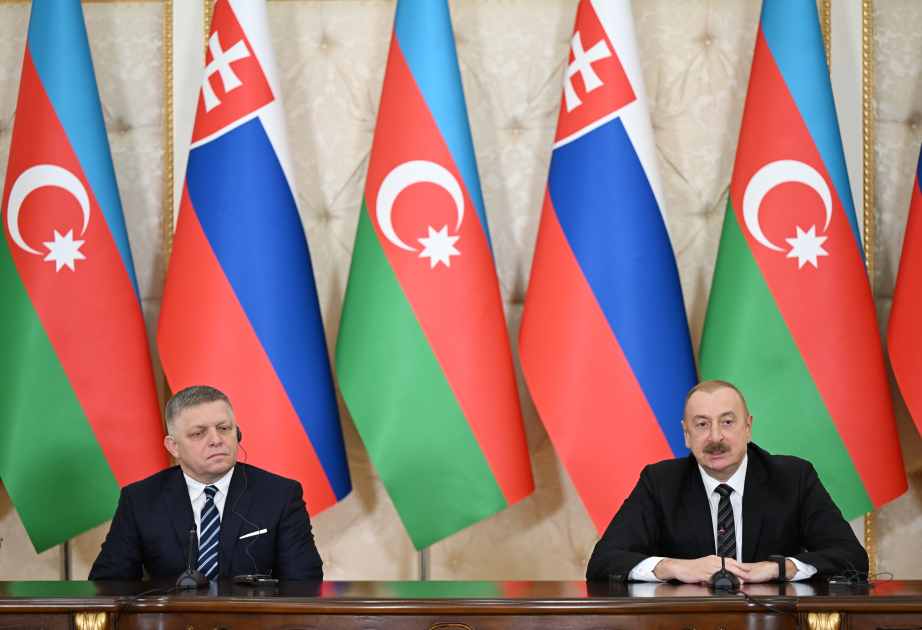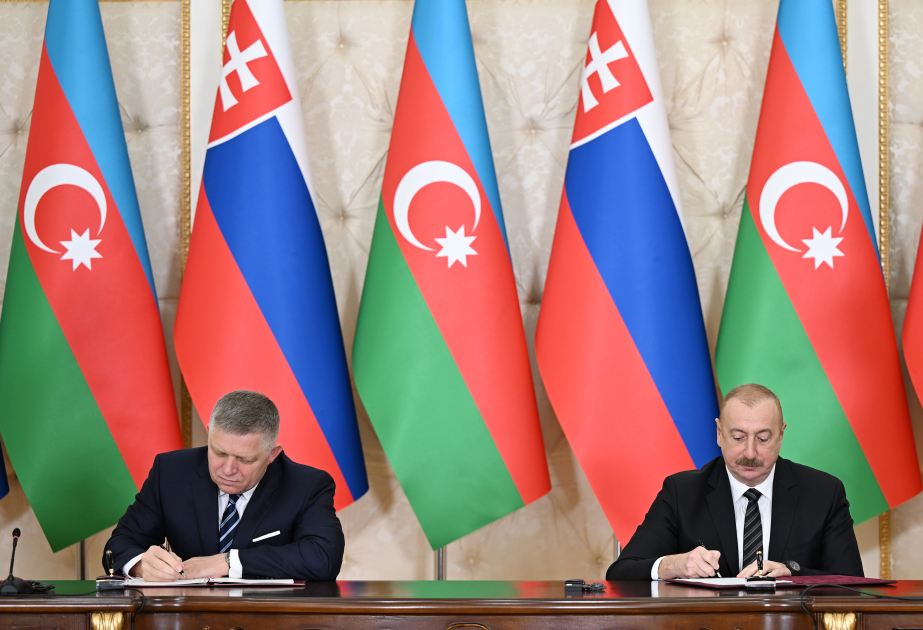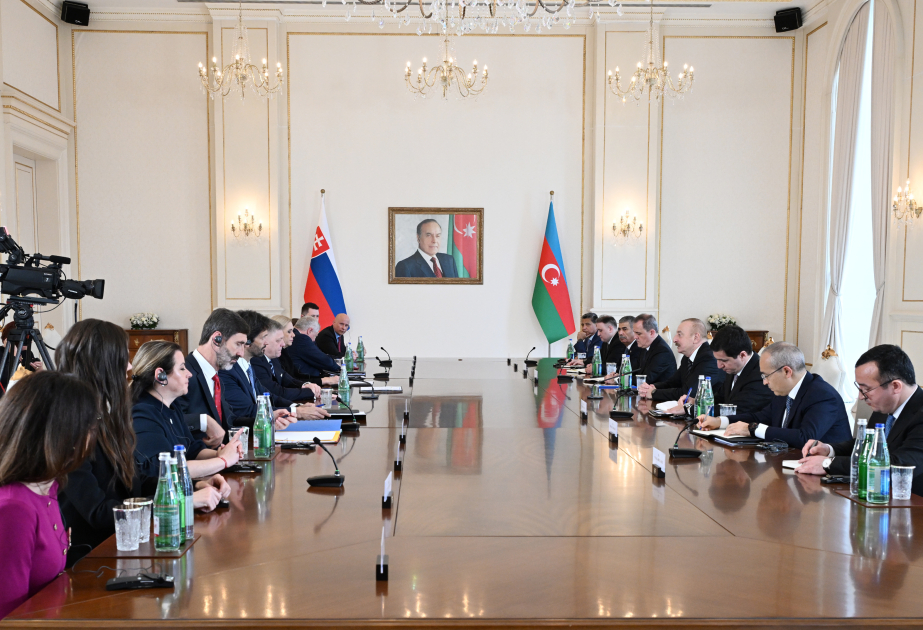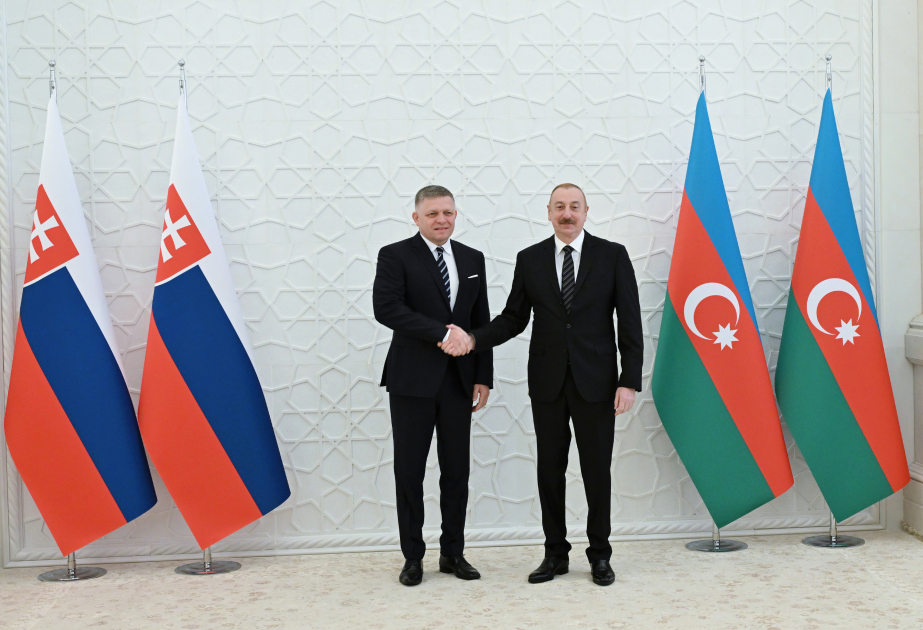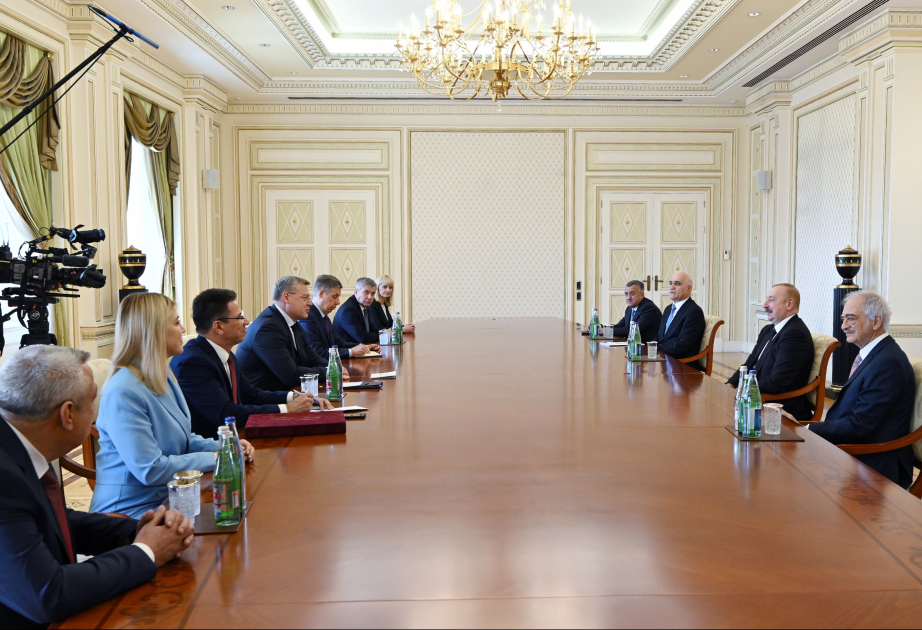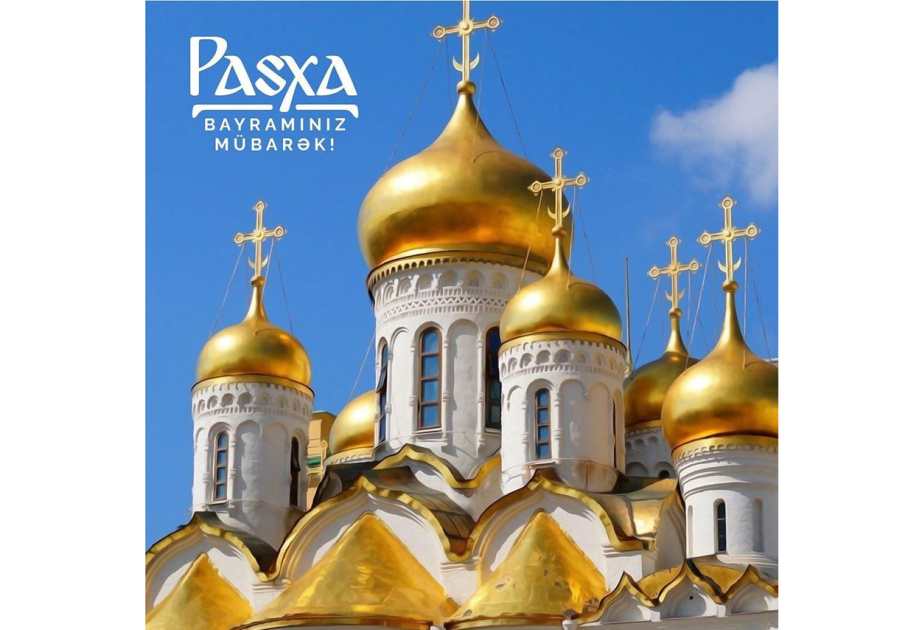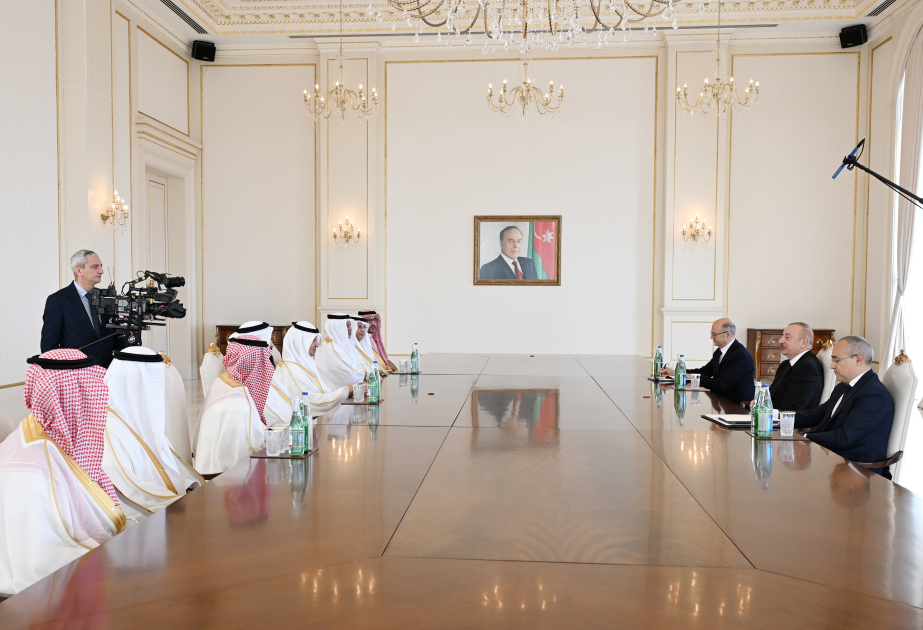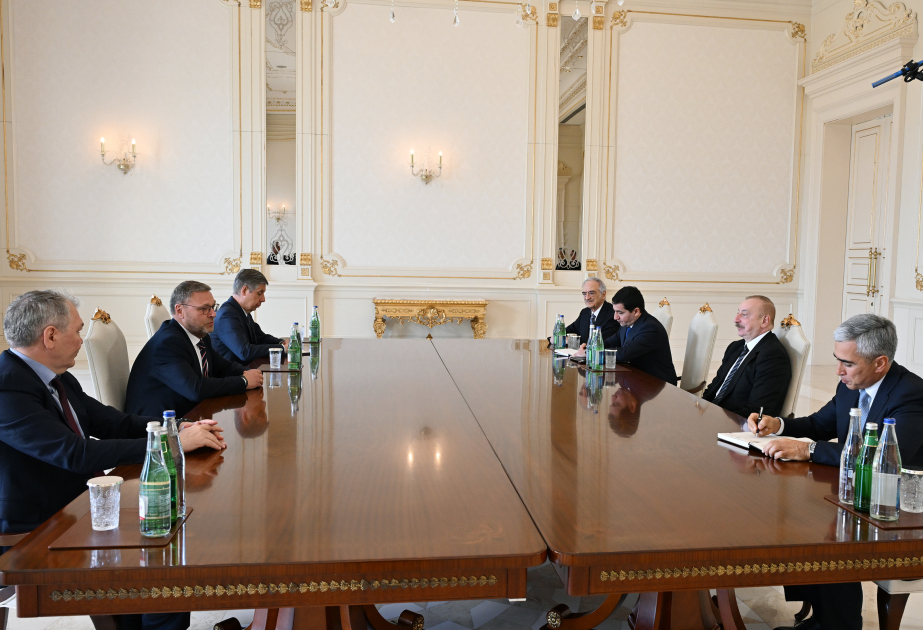OFFICIAL NEWS
President Ilham Aliyev: Attacks on monuments to Soviet soldiers are worthy of contempt VIDEO
Baku, May 7, AZERTAC
President of the Republic of Azerbaijan Ilham Aliyev has given an exclusive interview to First Deputy Director General of Russian TASS news agency Mikhail Gusman.
AZERTAC presents the interview.
XXX
- Hello, Ilham Heydarovich! I am delighted to see you. I had the honor of talking to you, interviewing you in different situations. But this is the first time we have had such an online format.
- Yes, you are right, the format is somewhat unusual. But everyone is already getting used to this form of communication. Therefore, I think that the content of our conversation will not suffer from this format. Although, of course, I hope to see you personally in the near future.
- Thank you, Ilham Heydarovich! I want to start with a question that seems very important to me. We are meeting literally on the eve of a great holiday - Victory Day. I know that you were going to come to Moscow and that many events were planned. But the harsh pandemic reality has left a mark. I know that Azerbaijan has always celebrated this great holiday very solemnly. This is natural and fair because more than 600,000 citizens of Azerbaijan were at the front, more than half of them fell on the battlefield and did not return home. One hundred and twenty-three Azerbaijanis were awarded the title of Hero of the Soviet Union. This is a huge feat of the whole people. At the same time, one cannot fail to mention the feat of the oil workers of Azerbaijan. Eighty percent of all fuel used for combat vehicles, tanks, planes, warships was produced on Azerbaijani fields and by Azerbaijani factories. In this connection, of course, I want to ask you how, despite these circumstances, you are going to celebrate Victory Day in Azerbaijan. What events will be held in spite of all these conditions? And how is this holiday generally perceived in Azerbaijan today?
- You are quite right that Azerbaijan has made a significant contribution to our common victory. We are proud that our republic has made an important contribution both at the cost of the lives of its sons and daughters and at the cost of the round-the-clock operation of our enterprises. You know that industry has always been very developed in Azerbaijan and various types of weapons so necessary for the victory were produced by our enterprises around the clock. And, of course, as you rightly noted, Azerbaijan was an important supplier of fuel. The deposits of Siberia were not explored yet at the time. Therefore, Azerbaijan was the main source of fuel and lubricants. And it is no coincidence that fascist Germany intended to seize Baku. These famous shots were demonstrated many times: when Hitler was presented with a festive cake with the “Caspian Sea” written on it. In fact, the borders of the Caspian Sea were somewhat specifically made and he inserted the swastika into it. If this had happened, then, of course, the outcome of the war could have been completely different.
Of course, as you rightly noted, we are proud of our heroes who were rightly acknowledged by the Soviet state. A total of 123 Heroes of the Soviet Union, the people we are proud of - the present and future generations should be proud of.
As for events, in the conditions of the coronavirus, all public events have been canceled for a long time, of course. Moreover, people over 65 are not yet recommended to leave home. We must take care of our veterans. Unfortunately, every year there are fewer of them.
Usually, on 9 May, I always meet with veterans, we lay flowers and wreaths together, honor the memory of the fallen, and communicate. I can tell you that it is so energizing to talk every time. Many of them over 90, even under 100 years. But first of all, they demonstrate good physical health and, most importantly, their morale, their optimism and love of life, of course, are amazing, astonishing. We can only admire them. We allocate awards for veterans every year. This year it is around $900 or 1,500 manats, if we count in manats. During the year, we also solve their problems.
I must say that such an attitude to our common victory has not always been the case in Azerbaijan. Unfortunately, in the early years of independence, when the anti-national regime of the Popular Front came to power through a military coup, 9 May was deleted from the holiday calendar.
War veterans were subjected to moral terror, a frenzied media campaign was waged against them. Only after Heydar Aliyev returned to power was 9 May restored in the holiday calendar. Since then, this date has been a public holiday. It is a day off. Justice has been done.
You are right, I was going to come to Moscow. I received an invitation from the President of the Russian Federation. But holiday events have been canceled due to the coronavirus. Therefore, this year I will remember the fallen again, but in a completely different format, of course.
- By the way, President of Russia Vladimir Vladimirovich Putin said that we plan to mark this date in Russia nonetheless, when the epidemiological situation is more favorable. It was stated that all invitations were valid. Therefore, I think that when this is determined and dates are set, you will still have the opportunity to celebrate this holiday in Moscow together with the Russian leadership and your colleagues from the countries of the Commonwealth of Independent States.
- Yes, I count on that.
- Ilham Heydarovich, you said quite rightly that, unfortunately, this holiday disappeared from the calendar in the sad times of the Popular Front. Indeed, only with the ascent of Heydar Aliyev to power did justice triumph. The people are celebrating this holiday today. All the more surprising is the fact that there are still countries where politicians are trying to rewrite history, to falsify it. Some countries are destroying monuments to Soviet military commanders who liberated cities, to Soviet soldiers, while others are even erecting monuments or plaques to fascist collaborators or just figures of the fascist regime. What is your attitude to this situation?
- We strongly condemn attempts to rewrite history and to distort the truth about the Great Patriotic War, and any attempts to glorify fascism and fascist criminals. Azerbaijan has openly spoken out on this subject in many forums. I have repeatedly voiced my position on this issue. I must say that this position is fully shared by Azerbaijani society. Of course, it is completely unacceptable for us that the process of glorification of fascism is taking place in some countries. You know, it seemed some time ago that there were such unshakable beliefs that did not require proof. And the history of World War II is one of them. Unfortunately, we sometimes see concerted efforts of certain circles to distort historical truth, to downplay the role of the Soviet Union in the victory in World War II and to glorify fascism. This trend must be stopped. Only through joint efforts can we do this. This includes communicating the truth about what happened during the Great Patriotic War to the younger generation. They must know the truth, they must be educated in the spirit of patriotism, in the spirit of the heroism of their ancestors. Of course, what is happening in some countries when there are acts of vandalism in relation to the monuments of World War II, when monuments are erected to the Nazis causes a feeling of contempt and disgust. It is particularly unpleasant when we see this in the republics of the former USSR, in the CIS. After all, the Soviet Union made the biggest sacrifice for the sake of a common victory over fascism.
Therefore, these trends must be condemned and these attempts must be stopped.
I think that world leaders should talk about this more openly. As I have already noted, I have repeatedly raised these issues, including the last CIS Summit where one of the topics of discussion was preparation for the celebration of our Great Victory, for the anniversary of the victory. I noted that, unfortunately, the glorification of fascist criminals is becoming commonplace in Armenia. I provided specific examples of a six-meter monument to fascist executioner and criminal Garegin Ter-Harutyunyan, who is known by the nickname of Nzhdeh, being erected in Armenia several years ago. The crimes of this man are proven. By the way, this is evidenced by documents published by the Ministry of Foreign Affairs and by the Ministry of Defense of the Russian Federation on the eve of the 75th anniversary of the victory. This is someone who said during the war: “Whoever dies for Germany dies for Armenia”. This is someone whose acts of sabotage led to numerous victims, and it is no coincidence that he was arrested by SMERSH after the war, sentenced to 25 years and died in a Vladimir prison. This is a person a six-meter monument is erected to in Armenia. The former president of this country participated in the unveiling of the monument. By raising this issue, I wanted to draw the attention of my colleagues in the CIS to the fact that we should, first of all, dot all the I’s at home, in our own organization. We should not be guided by the principles of political correctness, selectivity or unwillingness to offend anyone. We must tell the truth, otherwise discussions in the format of this organization will lose their essence, frankly. Therefore, I raised this issue. Moreover, I expected that the new leadership of Armenia, which is trying to portray itself as being democratic, will support my initiative. Unfortunately, I saw exactly the opposite. I saw that the head of the Armenian delegation, the prime minister began to defend this criminal, saying that Ter-Harutyunyan’s stay in the camps does not matter because Solzhenitsyn was also in the camps. You know, I broke the protocol, took the floor again and said that it was the pinnacle of cynicism - to compare Solzhenitsyn with a fascist henchman. Therefore, all this causes great surprise and bewilderment, and suggests that the government in Armenia may change but the essence of the regime remains the same.
By the way, I must say that a memorial plaque for the criminal and accomplice of the Nazis, Nzhdeh, was also installed in the territory of the Russian Federation, in particular, in the city of Armavir. Only after I raised this issue at the Summit of Heads of State and after it was already covered in the media was it dismantled. A reasonable question arises: didn’t Armenia have its own heroes in the Great Patriotic War? So why wasn’t a memorial plaque installed for them near the Armenian church in Armavir, but for a fascist criminal? What does it mean? These questions should be broadly discussed - without selectivity and political correctness, but directly and explicitly. Each country should express its attitude to this issue. If, on the one hand, they say in Armenia that they will celebrate the anniversary of the victory but on the other lay flowers at the monument to the fascist, then this is at least contradictory, but in fact is a manifestation of hypocrisy.
- Thank you, Ilham Heydarovich, for such an accurate assessment of this situation. On 4 May, on your initiative - Azerbaijan currently chairs the Non-Aligned Movement - a Summit of the Non-Aligned Movement was held, which can already be described as historic in terms of the composition of the participants. It was dedicated to the development of joint solutions and joint ideas for the fight against coronavirus. You presided over this summit. Leaders of a huge number of countries took part in it, including leading countries such as India, Egypt, Iran, etc. After this summit, as its chairperson summing up the results now, how do you assess it? What did you manage to work out and agree on in practical terms?
- You are absolutely right. This summit can quite rightly be described as historic because, firstly, it was held in a new form - in the format of a video conference. Secondly, as a rule, summits of the Non-Aligned Movement take place with a certain periodicity. And because we held a summit in Baku in October last year, the next one was supposed to take place already in the country that will chair after us in 2022. Therefore, the initiative of Azerbaijan as the chairing country in the Non-Aligned Movement was quite timely, of course. I must also say that Azerbaijan was unanimously elected chairman of the organization at the Summit of the Non-Aligned Movement in October last year, which is also a very significant factor. As you know, 120 countries are involved in the movement and there are, to put it mildly, certain tensions between some of these countries.
But the respect and trust that was shown to us shows that Azerbaijan has managed to gain very great authority in the international arena. During the Baku Summit, I talked about the fact that we do not consider our chairmanship as purely formal. We want to be an effective chairing country, we want to increase the credibility and role of the movement in the international arena. We want more cohesion among countries. We want to ensure that the differences existing between some countries are resolved and, if necessary, with our participation. I also said that Azerbaijan will protect the interests of member countries in the international arena not only during the period of its chairmanship, but also afterwards. The fact that the Summit took place suggests that, firstly, we are true to our word and, secondly, there was a great need for the Summit. Therefore, most of the speakers noted the timeliness and importance of the Azerbaijani initiative. I must also say that the leaders of authoritative international organizations sent messages of greeting to the Summit: Secretary General of the United Nations António Guterres, the President of the UN General Assembly, the Chairman of the African Union, the Director General of the World Health Organization and the Vice President of the European Commission. I want to emphasize this. I do not remember another situation when the European Commission and the Non-Aligned Movement were involved in a single format. In this case, Azerbaijan’s active relations with the European Union and great authority in the international arena have made such a joint event possible.
Also, of course, a common trouble is capable of uniting countries. Therefore, the main objective of the Summit was to show solidarity within the organization, as well as effective cooperation with leading international organizations. On my initiative, we suggested holding a special UN General Assembly at the level of heads of state and government dedicated to coronavirus. We have allocated $5 million to the World Health Organization to provide immediate support to the most vulnerable member countries of the movement. This is our second donor contribution. Prior to that, in March, we also committed $5 million to WHO to tackle the global pandemic. The created format of the Contact Group in the Non-Aligned Movement has received great support from member countries. We proposed the establishment of subgroups for different directions and creation of a single database to combat COVID-19, so that members of the movement with such intentions, as well as international organizations and donor organizations have information in order to provide timely assistance. I would say that these are the main goals and results of the Summit. Again, I must say that all the participants noted its importance and necessity, and expressed gratitude to Azerbaijan for this initiative.
I must say that this is not the first summit we have held. Azerbaijan also currently chairs the Cooperation Council of Turkic-Speaking States. And the Summit of this organization held on 10 April on the initiative of Azerbaijan was actually the first summit in the world in the form of a video conference. Within two months, we held two major international events, which I am sure will strengthen solidarity and cooperation.
Another point in connection with the Summit of the Non-Aligned Movement is that, as I said, the Non-Aligned Movement includes 120 countries, the African Union, whose chairman addressed the message, has 55 countries, the European Union, whose high representative also participated in the event, includes 27 countries. Therefore, without any false modesty, I can say that Azerbaijan and the Azerbaijani initiative have united almost the whole world.
- This is really the case, Ilham Heydarovich. I would also like to express the idea that, of course, Azerbaijan’s chairmanship and certain contributions to the World Health Organization are important facts. But it seems to me that Azerbaijan had the moral right to convene this Summit. Objective figures show and the World Health Organization confirms that although this terrible pandemic did not bypass Azerbaijan, the country, I looked at the numbers, has achieved certain successes in this struggle. It seems to me that you have managed to slow down the situation and even reverse it in some way. In any case, this is what the figures suggest and WHO confirms. How did you do that? What efforts have been made? The experience of any country that manages to cope with this universal misfortune to a large extent is very important today.
- You are absolutely right. It is too early in the day to talk about the final results, but intermediate results suggest that we are on the right track. In fact, the work we have organized and are doing was also acknowledged by the World Health Organization. In his letter to me, the Director General of this organization gave a high assessment to the actions of the Azerbaijani leadership. Azerbaijan was also described as a model country, i.e. a country that sets an example in the fight against this scourge.
As regards the specific measures, I should say that from the very beginning we set up a Task Force under the Cabinet of Ministers, which had very broad powers and dealt with important organizational issues on a daily and hourly basis. As you know, I think the main goal for all countries was to slow down the development of the disease, to slow down its spread. Azerbaijan and indeed many other countries imported this virus. Therefore, closing the borders with neighbors after appropriate consultations was an important first step. But then we saw that a process of internal infection had already started. Therefore, restrictive measures were introduced in a phased manner. We introduced them in accordance with the situation and always sought to get ahead of events, not to lag behind, otherwise we would not have succeeded.
We quickly organized the work of state hospitals in a completely new format. Today, more than 20 public hospitals have been made available for the treatment of patients with coronavirus, including the most modern and new hospital with 575 beds, which has been fully provided to patients with coronavirus. We promptly purchased additional laboratories, which are now 23. If necessary, we will purchase more. For the number of tests per million people, Azerbaijan is among leading countries. We have done more than 160,000 tests. Of course, this helps us identify foci, including regionally. Certain mitigations began on 4 May and prior to that on 27 April. They were caused by the fact that over the past three weeks we have observed a positive trend. That is, the number of recovering people exceeds than the number of new cases.
Also, of course, we are very careful about our doctors and medical staff. For those who look after patients with coronavirus, special allowances have been introduced, which exceed their monthly salaries three, four and five times. Therefore, the complex of these restrictive measures, including the measures aimed at the proper organization of the treatment process, has helped us to get out of this situation with minimal losses so far.
I would also like to point to the high level of popular support for our measures. I receive hundreds, sometimes thousands, of letters of appreciation every day, where people of all walks of life from small kids to long-livers express their gratitude for the fact that we are so far coping with this situation with dignity. But we also said that if we see that measures to relax the quarantine regime lead to a sharp deterioration in the situation, we will have to tighten them again. And in my repeated appeals to the Azerbaijani people, I said that we did display solidarity and unity but we also need to show responsibility and discipline. I think that these two areas still require a separate discussion. But, in general, I think that the situation is under control so far.
I must also say that we have allocated about $2 billion in the form of a socioeconomic package to those affected by the pandemic. This is about 700,000 people employed in the areas worst affected by the pandemic and micro-entrepreneurs. The state pays a substantial part of their wages for two months, because they practically do not work. This is 600,000 low-income families and the unemployed, including even those who are employed in the informal sector, i.e. those who do not have employment contracts. For two months, they are paid a certain amount because even those who did not have an employment contract had an income. Now they have been deprived of it.
We increased the number of families that receive targeted social assistance to 80,000, and every such family receives an average of 222 manats, or 130 dollars. We are also creating 90,000 public jobs with a salary at the level of the minimum wage - 250 manats, or about 150 dollars. A total of 12,000 self-employed people will be involved this year as a result of financial and technical assistance from the state. This is only a part of the package. There are also tax breaks and tax holidays. In other words, we have a very broad approach to this issue and are trying, first of all, to protect people, protect their health, their lives, and, secondly, to ensure the development of the economy.
- Ilham Heydarovich, for you, of course, it is no secret that a growing number of experts, analysts and politicians have been saying that since the end of the pandemic will sooner or later come, although it is still on an upward trend for the time being, the world will not be the same. It will change. It will change socially, it will change economically, it will change in some ways culturally. In recent years, Azerbaijan has hosted a huge number of major events: sports, cultural, political, economic, various forums. Everything you talked about before was based on rock solid facts and precise figures. My question is more from the area of speculation. How do you see the world in the post-pandemic period? It is a world we all have to live in after all. Young people are asking this question particularly often these days, because they are faced with a lot of psychological difficulties. For the elderly, there are still many physical risks involved. How do you see the world in the post-pandemic period?
- You know, many political, public figures and, I must say, the broad international community note that the world will be different, and it already is different. We are gradually getting used to the new format of work, to a new format of life, to the regime of self-isolation. In essence, this, of course, has a very serious impact on the lifestyle and psychological state of many people, especially under strict quarantine. We perfectly understand that sitting at home for weeks and not going out is a very serious test for people who are used to an active lifestyle, who are used to working actively. As I noted, we are paying money to those who have lost their jobs. But it was not only their wages that was the motivation. People essentially lost their dear jobs and this, of course, can also have a serious impact on their psychological state. Therefore, it is difficult to imagine what the world will be like in the future.
As for the holding of international events, the two summits I have mentioned showed that we can work in this format as well. Of course, there is a lack of communication. If we held a summit as usual, then, of course, it would last two days, maybe three. There would be a lot of bilateral meetings, many cultural events. But, for example, on 4 May, the summit lasted for six and a half hours without any breaks. As chairman, I could not leave. Therefore, we need to get used to living in this format.
Regarding international forums, you rightly noted that Azerbaijan has already become an important platform, primarily for humanitarian cooperation. The Baku International Humanitarian Forum, which is held under the patronage of the presidents of Russia and Azerbaijan and in the emergence of which you, Mikhail Solomonovich, personally played a huge role, the Forum on Intercultural Dialogue and many other events that have now been postponed raise questions as to how
will we conduct them. Whether it will be possible to hold international forums and discussions via a video conference or not is still a question for the future. But one thing is obvious: after the coronavirus is defeated, which I hope will be the case, it will take a very long time to get out of this situation in a purely working order, psychologically. It is very difficult to say how long it will take. However, I think that the key thing is to preserve the content, including the matters of international politics, to maintain a positive experience of cooperation, so that this temporary disconnect does not divide countries, so that we can maintain a dialogue and work in the form of a video conference. In fact, I have already had several meetings with my colleagues in the format of a video conference. The form, of course, will be different, but the main thing is to preserve the positive content and increase the positive aspects that we see as a result of the pandemic. This may be an early manifestation, but solidarity is visible. Sign of cooperation are visible even between countries that have fairly tense relations.
- Speaking about what you have just said, Ilham Heydarovich, the need, despite these difficulties, for developing and strengthening cooperation. I would like to touch upon your relations with President of Russia Vladimir Putin, with whom you have developed, as far as I know, quite solid, comradely and what is called personal chemistry, personal relations. You have paid visits to Russia and President Putin has visited Azerbaijan. Under these circumstances, doesn’t it seem to you that, expanding on your thought, it might be necessary to intensify these ties even more precisely in order to find new solutions and a new format of cooperation in the new conditions?
- Yes, you are absolutely right, and we are working on that even during the pandemic. There is uninterrupted transport communication. We have agreed to intensify work in the transit and logistical sphere. As far as trade between countries and between Russia and Azerbaijan is concerned, the pandemic will certainly have an adverse impact. But I am sure that we will maintain and increase the positive cooperation.
As you noted, the President of the Russian Federation and I quite often meet both in Russia and in Azerbaijan. This last happened in St. Petersburg at the end of the year. Before that we met in Sochi. I was invited to the Valdai Discussion Club. Our communication and meetings give a very positive impetus to the development of our interaction. And the instructions and guidance we give to our subordinates are being implemented. Political interaction is at a very high level.
Of course, if it hadn’t been for the pandemic, we would have continued to increase our trade. But I am sure that economic relations will be up to standard. We also have major plans in the transport and logistical sector - not only within the North-South corridor, which we are actively using today. We are glad that Russia has also joined the North-West transport corridor: through Azerbaijan towards Europe. Russian shippers are already using this route. There is great potential in the power engineering sector - in terms of electricity exchange and multilateral cooperation because we are connected by high-voltage power lines.
In the oil and gas sector as well. Many may not know this, but a part of the oil produced by Russian companies in the Russian sector of the Caspian Sea is transported via Azerbaijan’s transit infrastructure. So the cooperation here is on an upward trend.
And, of course, it is imperative to note, as we always do with the President of Russia, the humanitarian cooperation. I think that it is an example of cooperation between neighbors. Russia highly appreciates the fact that there are more than 330 schools in Azerbaijan where teaching conducted in Russian. The branches of leading Russian universities, a fairly rich cultural program, and, of course, the opening, recreation of the Azerbaijan pavilion at the Exhibition of Achievements of National Economy, its grand opening - this also is evidence of our friendly relations.
Of course, we regret that the pandemic has hit the tourism sector very hard. Last year, about a million Russians visited Azerbaijan. We counted on a further increase in the number of Russian tourists this year. But we will wait until everything settles down and people begin to visit each other again. Therefore, you are absolutely right that we shouldn’t waste time and much remains to be done this year. We are in constant contact and work as close friends and partners.
- Ilham Heydarovich, when one talks about the future after the pandemic, the energy sector is a separate issue. Of course, the pandemic occupies the entire news agenda these days. But just recently, the topic of oil prices supplemented it. The world was in a fever, everyone was watching the developments as if they were some kind of a detective story, when the oil price almost went negative. For some reason, everyone become a specialist in the oil industry. Azerbaijan is a historically oil-producing country, but at the same time, you have been saying for many years that Azerbaijan needs to get rid of its dependence on the oil needle. I am not ready to predict the oil price but in terms of getting away from this dependence, what sectors of the economy do you count on? What do you see Azerbaijan like in the post-oil period?
- You are absolutely right. I have been raising this topic very actively and certain steps are being taken in this direction. Suffice it to say that in the first quarter of this year, industrial production in the non-oil and gas sector grew by 23 percent. This is an absolute record. In the pandemic, I think this figure, of course, causes certain respect for the work we have done. Therefore, the focus on the non-oil sector has been and remains a top priority. As I have said many times, we need to forget about the oil sector. In fact, with such oil prices, the post-oil era has essentially already set in. Therefore, the main driving force behind the growth of the Azerbaijani economy will be its whitening. A lot is being done in this direction, i.e. withdrawal of the economy from the shadows. Unfortunately, this problem is still relevant for us. All the issues here - from informal employment to tax evasion - are closely intertwined. The measures we are taking are fruit results. We replenished the budget last year and this year significantly due to the whitening of the economy. So this will be the main driving factor.
As for the industrial sectors, first of all, of course, I would mention agriculture, where we have a very large potential and major investments were made. Growth is quite substantial. Then there is transport and logistics. All transport and communication projects have almost been completed in Azerbaijan. We are a country that is actively involved in the East-West transport corridor. This is a part of the "One Belt, One Road” initiative, the North-South corridor and, as I have already noted, the North-West corridor. Therefore, the creation of the transport and logistical infrastructure has been completed and today we are working with partners and neighbors in order to increase transportation and Azerbaijan’s transit capabilities.
We were paying great attention to tourism. The sector was very promising. In the past four years, tourist growth has been between 10 and 24 percent. Modern tourism infrastructure has been created. Of course, the pandemic has hit this sector very hard. We are now thinking of stimulating domestic tourism, especially considering that millions of Azerbaijani citizens leave the country during the year, including vacation. In other words, they will probably be reoriented to domestic tourism this summer taking into account the closed borders.
And of course, the sector of information and communication technology. There is good progress there too. Azerbaijan is already a member of the club of space-faring nations and has three satellites. The ICT sector is very actively developing, and there is very substantial growth in this area. Therefore, I think that these areas will continue to play an important role. Returning to global economic issues again, the goal is to further improve the business climate for both local and foreign investors and support small businesses. We are taking major steps in this direction now. This will provide both employment and economic diversification. We know from the example of developed countries where small and medium-sized businesses account for more than half of the GDP. We must strive for this.
- Ilham Heydarovich, another issue being discussed in relation to the pandemic now is the effectiveness of international organizations. You have described the successful historic forum, the Summit of the Non-Aligned Movement, which was dedicated to the pandemic. But there is a lot of criticism of the United Nations now. The World Health Organization as a UN institution was seriously criticized as well. Azerbaijan is a confident and active member of most international organizations. You were a non-permanent member of the Security Council. Azerbaijan actively works in the system of the Commonwealth of Independent States, the OSCE, etc. First, how justified is this criticism of international organizations in your opinion? How prepared were international organizations for this common misfortune? On the other hand, do you see the need for reformation of international organizations, for some new options of interaction among international institutions in order to be ready? After all, we always have to wait for something.
- You know, I think that the main factor in this direction is the will of individual countries. After all, international organizations consist of countries, and countries delegate their representatives to these organizations, countries defend their interests within these international organizations. Those who lead international organizations are international officials. Of course, one must understand their difficulties when they have to make responsible decisions that some may like but others may not. Therefore, their art of diplomacy, of course, also largely determines the credibility of an international organization.
As for Azerbaijan, we participate in every organization precisely to strengthen this organization because we are a member of it, and also to secure our national interests within the framework of this organization to the maximum possible extent. But first of all we strive to gain even more confidence from member countries. The initiatives we are implementing are aimed just at that. For example, the initiative to provide financial assistance to the countries of the Non-Aligned Movement through the World Health Organization is a specific matter.
Unfortunately, there are many words in international organizations, in fact, template words that are copied from one year to another, from one report to another, and there is nothing behind them. Of course, any international organization consists of powerful countries, those of medium welfare and countries that still need to grow a little. Therefore, it is also important to take into account the interests of all countries here, so that the countries that do not have major financial, political or other resources do not feel deprived, so that they do not feel as secondary members. Therefore, I consider mutual respect within the framework of international organizations as one of the important priorities. Of course, to achieve this within the framework of global international organizations uniting the whole world or 120 countries, such as the Non-Aligned Movement, is more difficult than in smaller ones. But I think that this should be the main motivating factor for politicians.
Of course, the credibility of an international organization largely depends on the implementation of the decisions it makes. And I must say that this is where there is a lot of room for reform. Even UN Security Council resolutions adopted many years ago are not being implemented. Azerbaijan went through this itself. For about 30 years, UN Security Council resolutions on the withdrawal of Armenian occupying forces from Azerbaijani territory have not been implemented and no sanctions have been imposed on the aggressor, on someone who violates these resolutions. Therefore, there must be a punishment mechanism. If an international organization makes a binding decision, it must be implemented. In relation to the member that violates decisions, there must be a procedure that can consist of several stages, but there has to be one. But it is not there. I think these are the main factors causing certain disappointment in international organizations. I can also tell you quite frankly that sometimes we observe actions that run counter to international law. This, of course, does not add credibility to international organizations and generally casts doubt on the modern world order. Because international law should be a priority for everyone. Regardless of their potential and capabilities, countries must respect international law. And when we see that it is sometimes violated flagrantly and defiantly, then the question arises: why should we observe it? If others can afford to break it, why can't we break it too? I am not saying that we are going this way. No. Azerbaijan always focuses on the rule of law and the rule of international law. But such questions legitimately arise and of course, we need to look for a joint answer to them.
- Ilham Heydarovich, I want to ask you for practical advice. You, as the head of state, are in a difficult situation. On the one hand, you must comply with quarantine, and I know that you observe it as a citizen and simply for the sake of basic safety. But on the other hand, watching you on TV, the intensity of your public activities does not decrease. How do you do that? In addition, you have always paid great attention to maintaining physical fitness and probably continue to do so now. Please give some advice to your fellow citizens and our viewers: how to maintain such a physical form under quarantine conditions?
- Well, physical fitness can be successfully maintained at home. This is no secret to anyone today. There are many information resources which show how one can actively do sports at home without going to the gym. As someone who has been doing sports since early youth, I adhere to all the rules, of course. I consider sports one of the important factors for any person - in terms of health, for self-confidence and working capacity. I have repeatedly urged young and middle-aged people: do sports. Sometimes I repeat this a lot, but you have to repeat something so that people come to this. I recall repeating a lot that everyone should undergo medical examination when we began the extensive construction of hospitals. And today, when we conduct free medical examination - in fact, we did not because of the pandemic this year - more than 5 million people underwent medical checkups. The same should apply to sports. I say: do sports and you will see the benefits, you will see your fitness, mood and performance improve. Therefore, my advice to all those who do not have the opportunity is to use Internet resources. There are a lot of tips there, a lot of programs for doing sports at home.
As for the quarantine regime, I am a disciplined person in principle. Therefore, my public events gather no more than nine people. It is forbidden to gather in groups of more than 10 here. But to be on the safe side, I always say there should be nine, no more.
- You are tenth.
- Yes, tenth or ninth at maximum. And, of course, I keep my distance. This was the case at public events and at events related to meetings. We have held a meeting on the results of the first quarter in a video conference format. But let me say this: it was not particularly different from what we had done before. I have a video conference format with my subordinates too. In other words, a person can get used to everything in principle. Therefore, you also need to get used to this. But thank you for the question. Taking this opportunity, I want to urge everyone again: do sports and do it regularly.
- Ilham Heydarovich, speaking of the future end of the pandemic, it seems to me that you used a very correct and precise word: victory. You have seen the famous photograph of TASS photojournalist Yevgeny Khaldei “Victory banner over the Reichstag”. Our agency TASS has announced a worldwide photographic contest symbolizing victory over the pandemic. In your opinion, what could there be in this photo?
- Of course, this is a great initiative - thank you for that. I think that this competition will be of great interest not only to photographers but also to everyone. Because this is a topic that worries and unites everyone today. The desire to defeat this disease, the desire to protect one’s loved ones from dire consequences unite people. Therefore, I think a photograph or a symbol should be of such unifying nature.
Also, of course, when the world defeats the pandemic, I think that man and human mind should be the symbol. Human mind will defeat this disease when the vaccine is invented; human willpower because it is willpower that solves so many issues in difficult times; of course, mercy because despite the severity of the situation and the enormous human sacrifice, I think that the level of mercy in public consciousness has increased significantly; and also the understanding that everyone is equal before nature and before God, and everyone should show responsibility to their loved ones, to those they are responsible for, and act with dignity. This may be a somewhat wide palette of topics but I am sure that this competition will not do with just one symbol. Therefore, I think that there should be a collection of the best feelings, the best wishes, the best qualities of man and humanity.
- Thank you very much, Ilham Heydarovich. Victory over the pandemic with God's help and, as they say, with the help of world science, is a long way off but the holiday of the Great Victory over fascism is already round the corner. Millions of Russians, and not only Russians, will see our conversation. May I ask you to address them with the words you would have probably said in Moscow on 9 May?
- I want to congratulate all of us, veterans, the present generation, youth. This is a victory of the Soviet people, a victory of the Soviet Union which has historic significance. The contribution of every people of the former Soviet Union to this victory is invaluable. As we noted at the beginning of our conversation, the brown plague was stopped at the cost of millions of lives. Therefore, first of all, I want to express my deep respect for veterans, respect for the memory of those killed. It is thanks to them that we live today, live in independent states and build our own destiny.
And addressing the younger generation, I would like to urge them to learn to live and fight on the example of their ancestors - selflessly, with a great sense of patriotism, showing heroism, not sparing themselves, their lives, defending their homeland. This is a holiday we must celebrate at all times. This is a holiday that unites all progressive humanity, all peaceful humanity. And, of course, as we have already discussed, we must be irreconcilable to attempts to rewrite history, to attempts to distort the truth about the Great Patriotic War. I convey these wishes to all the veterans, to all those who are in service today. And may God grant them a long and healthy life.
- Dear Ilham Heydarovich, thank you very much for this conversation. Happy Victory Day! I wish you and Azerbaijan under your leadership a triumph over this pandemic. All the best to you. Thank you very much!
